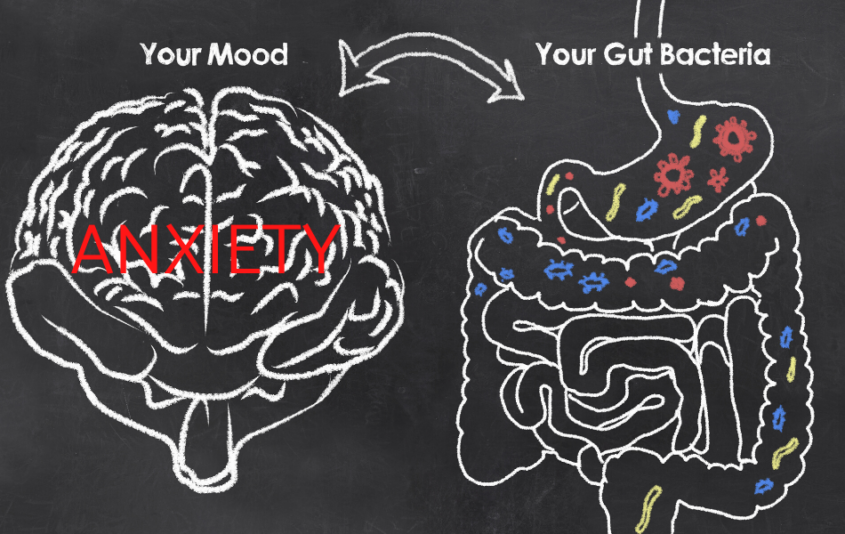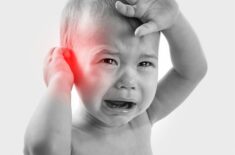The notion that the state of our gut governs our state of mind dates back more than 100 years. Many 19th- and early 20th-century scientists believed that accumulating wastes in the colon triggered a state of “auto-intoxication,” whereby poisons emanating from the gut produced infections that were in turn linked with depression, anxiety and psychosis.
– Charles Schmidt, for Scientific American
I’ve experienced varying degrees of anxiety and panic attacks since childhood.
But I didn’t think twice when I first began experiencing a variety of different chronic digestive tract symptoms a few years ago. (I’ll spare you the details, but suffice it to say it wasn’t pretty or glamorous.)
At that time, it never occurred to me that the two (anxiety + gut) could be related and mutually impacting each other.
But as it turns out, our minds and moods reflect the state of our GI tract (gastrointestinal tract).
Research suggests that a healthy gut plays an important role in maintaining good overall health and mental/emotional well-being.
Gut intelligence appears to be a real thing and your ‘gut feelings’ and hunches may have a scientific explanation after all.
It turns out you’ve got a second brain located in your digestive system.
Like the brain in your head, it’s made up of thousands of nerve cells that create what’s called your enteric nervous system.
The second brain is in constant communication with your central nervous system (brain and spinal cord).
In fact, the gut-brain sends way more information to the head brain than the other way around.
This means that gut health is brain health and vice versa.
If you’re suffering from anxiety or chronic mood imbalances and aren’t experiencing gut issues right now, you’re lucky… but this doesn’t mean it can’t start for you suddenly as it did for me later on.
And if you’re experiencing both chronic moods and chronic gut issues, take heart… You’re not alone and there are very specific actions you can take to start managing your situation more efficiently…
Evidence of the Brain-Gut Connection:
A growing amount of research is linking chronic stress to chronic GI problems, and vice versa (this is even worse if you have anxiety, which is an acute and more severe form of stress):
A review article published in the Journal of Physiology & Pharmacology concluded that exposure to stress (especially chronic stress) is a major risk factor for the development of different gut diseases such as gastroesophageal reflux disease (GERD), peptic ulcer, inflammatory bowel disease (IBD), irritable bowel disease (IBS). (1)
The review also confirmed that:
- Gut-Brain Axis imbalances play a central role in the development of stress-induced diseases.
- Stress weakens intestinal function and alters motility (the ability of your digested food and poop to move through your intestines and out the booty).
- Stress causes inflammation in the gut and the rest of the body.
- Stress can increase your sensitivity making the symptoms and discomfort feel worse.
One community study found Irritable Bowel Syndrome (IBS) to be ‘strongly associated’ with Generalized Anxiety Disorder (GAD). (2)
Out of 2005 participants, they found that:
- GAD was five times more common among those with IBS than those with no IBS.
- IBS was 4.7 times more common among those suffering from GAD than those not suffering from GAD.
Digestive tract dysfunction has also been linked to Alzheimer’s disease, Parkinson’s and Multiple Sclerosis.
A Growing Epidemic:
There’s a two-fold epidemic happening worldwide:
The percentage of those struggling with chronic anxiety is rising; as is the number of people experiencing some form of chronic GI condition.
Individually, anxiety is a growing trend.
As is the prevalence of gut dysfunction.
For many, unknowingly, one is feeding the other and vice versa.
And what’s even more alarming, women seem to be the most at risk for both epidemics…
ANXIETY STATS:

- According to the National Institute of Mental Health (NIMH) 18% of the US adult population experiences some type of anxiety disorder. This is approximately 40 million of us in the US alone. This makes it the most common mental health condition in the nation. (3)
- Women are 60% more likely than men to experience an anxiety disorder over their lifetime. (3)
- Only about one-third of those struggling with anxiety are treating it in some form. (4)
- Anxiety is the most common mental health condition in Australia as well. On average, 1 in 4 people – 1 in 3 women and 1 in 5 men – will experience chronic anxiety. (5)
- Up to 40% of the Australian population will experience a panic attack at some time in their life. (5)
- In the UK, there were 8.2 million cases of chronic anxiety in 2013. (6)
- In England, women are almost twice as likely to be diagnosed with anxiety disorders as men. (7)
- In Mexico, anxiety disorders are also the most common mental health condition: 14.3% of the population. Also most commonly experienced in women. (Are you seeing the patterns?) (8)
GUT STATS:

- IBS (irritable bowel syndrome) affects 11% of the global population. (9)
- 70 million Americans live with a chronic gastrointestinal (gut) condition (10)
- More than half of the US population is living with GI symptoms and not seeking help. (11)
- 72% of Americans experience one or more monthly bouts of gut “discomfort,” like pain, bloating, gas, and diarrhea. (11)
- An analysis of 4.7 million people in the US revealed that more people are diagnosed with acid reflux than any other GI condition (10)
- Around 70,000 people in Australia were living with IBD (inflammatory bowel disease) in 2012. The number of people hospitalized for ulcerative colitis and Crohn’s disease (the two most common forms of IBD) has almost doubled in the past decade. (12)
- In UK, 10-20% of the population experience IBS symptoms, though figure is thought to be higher than that as many people with symptoms don’t see help. (13)
- In Mexico, GI disorders are also prevalent. One study showed that 58.4% of the test group experienced one form of digestive disorder or another. (14)
How Mental Health & Digestive Health are Connected:
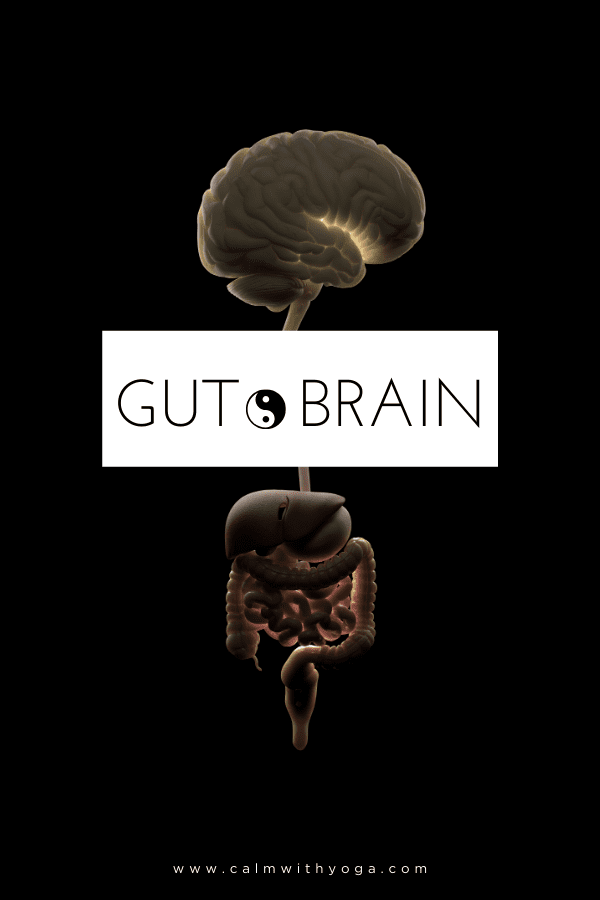
You have a universe in your gut.
Deep within the dark, almost oxygen-free recesses of your own gut lies an entire universe… of over 100 trillion microbes.
These little guys outnumber our cells 10:1. (15)
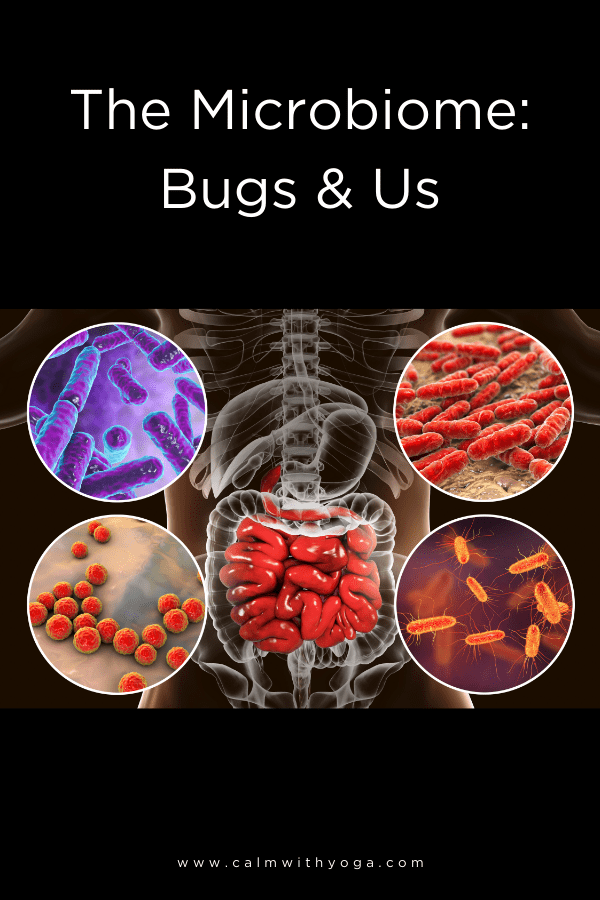
There are 100,000 times more microbes in your gut alone as there are people on earth. (16)
These microbes include “good” and “bad” gut bacteria, fungi, viruses, and other single-celled organisms.
Together, they make up your microbiome.
The health and diversity of your microbiome are determined by your:
- genetic makeup
- mother’s microbiome state
- diet
- metabolism
- age
- geography
- antibiotic usage history
- stress levels; and
- your predominant mental and emotional state (17)
What’s interesting is that there is evidence that the relationship between your microbiome and mental and emotional state is bi-directional.
How Your Microbiome Directly Impacts Your Mental State & Mood:
Did you know that 80% of your immune system lies in the folds of your gut?
Your gut bugs actually play a key role in helping regulate your body’s immune response. (18)
Inflammation is related to the body’s immune response.
One study conducted by McMaster University in Ontario, Canada found that chronic gut inflammation induced anxious-like behavior in mice. (19)
The study also found that this inflammation altered brain function and chemistry.
Another article published by the School of Medicine & Dept. of Psychiatry at Texas Tech University stated that:
“Increasing evidence has associated gut microbiota to both gastrointestinal and extragastrointestinal diseases.
Dysbiosis (imbalance) and inflammation of the gut have been linked to causing several mental illnesses including anxiety and depression, which are prevalent in society today.” (20)
How To Balance Out Your Gut & Mind:
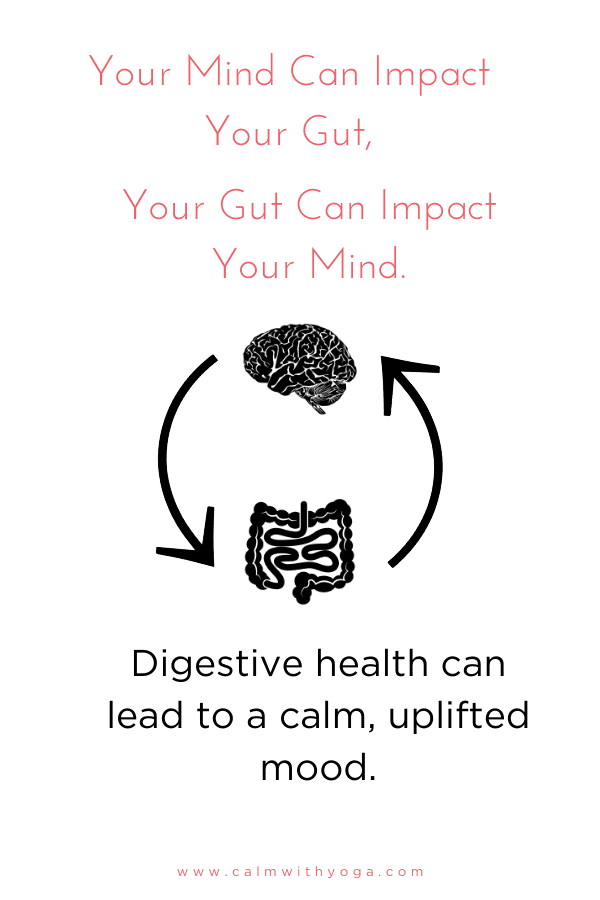
Since it appears that this anxiety-gut connection is a two-way street, the best course of action is to begin adopting a two-pronged approach that addresses both.
For Your Gut:
Your gut may actually be contributing to your anxiety.
What you’re eating, how you’re eating, and when you eat it might be unnecessarily causing you more angst, stress, and overwhelm.
Here are 3 powerful choices you can make immediately to help your gut work alongside your mind:
1. Cut out or at least greatly minimize your consumption of sugar, processed foods, additives/preservatives.
Your gut microbiome responds to what you feed it.
When you regularly eat a variety of healthy, non-processed foods, your microbiome becomes programmed to work for you…
Refined carbohydrates, sugar and processed foods get absorbed quickly into your small intestine without any help from your microbes.
That means your gut microbes stay hungry so they begin snacking on the cells that line your intestines, causing what we call leaky gut.
Your intestinal lining is meant to be a strong barrier between your gut and the rest of your body.
– Dr. Christiane Northrup, women’s health expert and best-selling author
Excessive consumption of sugar and processed foods has been linked to an altered microbiome and other gut imbalances.
“The quantity of refined sugar in the diet can significantly influence gut function and the composition of bowel contents,” says a study that found that diets high in refined sugars/ carbohydrates lead to imbalances of your gut bugs, possibly leading to an increase in numbers of some strains of bacteria. (21)
It also appears that diets high in refined sugars/carbs might increase bowel transit time.
The longer your poop stays inside you, the higher the risk of your exposure to potentially toxic bowel contents. (22)
2. Increase your consumption of quality, organic prebiotic and probiotic foods.
The food you eat can be either the safest and most powerful form of medicine, or the slowest form of poison.
– Ann Wigmore, holistic health practitioner & author
Probiotics are live bacteria cultures. (Essentially, gut bugs.)
When we ingest these little guys a good amount of them reach the intestine in an active state and promote multiple beneficial health benefits, like helping keep your microbiome balanced so that there is no overgrowth of detrimental bacteria that can lead to infections and other health problems. Probiotics have also been shown to interact directly with the immune system, helping to reduce gut inflammation and reducing the body’s stress levels. (23)
Not having enough probiotics in the gut can lead to imbalances of the microbiome, which has been linked to GI conditions like inflammatory bowel diseases (IBD) like Crohn’s Disease and Ulcerative Colitis, irritable bowel syndrome (IBS), and even obesity, and type 2 diabetes. (24)
Probiotic-rich foods include: (25)
- fermented yogurts and kefir (*if you can tolerate and are not allergic to dairy, lactose, and casein, use coconut versions)
- fermented vegetables like kimchi and sauerkraut
- raw cheese (*if you can tolerate and are not allergic to dairy, lactose, and casein.)
- brine-cured olives
- pickled vegetables
- apple cider vinegar
- kombucha
Prebiotics aren’t living organisms like probiotics; they’re a substance that comes from fermentable fibers that we eat but cannot digest.
Prebiotics are essentially food for the probiotics in our gut.
Probiotics eat prebiotics and then ferment what’s left into what’s called short-chain fatty acids (SCFA’s.)
This process releases the neurotransmitter serotonin and anti-inflammatory agents which reduce stress signals to the brain. (26)
Kara Landau, CEO of Uplift Food and nutrition advisor to the Global Prebiotic Association says:
“When we consume prebiotics, the probiotics naturally found inside of us are able to ferment these nutrients, with a key by-product of the fermentation process being short-chain fatty acids (SCFA).
Considering mental health issues are starting to be understood as not merely a hormone deficiency, but rather also a result of internal inflammation, it makes sense to support our bodies with an anti-inflammatory diet, of which prebiotics, and probiotics, are one part.” (26)
Although more research is needed, it certainly does appear that regular consumption of both pre and probiotics can help regulate our hormones and therefore regulate our mood.
One study out of Oxford University found that consumption of prebiotics can significantly impact the brain, lowering stress hormone (cortisol) levels and therefore lower the body’s stress response and anxious tendencies. (27)
Prebiotic-rich foods include: (28)
- acacia gum
- raw chicory root
- raw Jerusalem artichoke
- raw dandelion greens
- raw garlic
- raw leeks
- raw or cooked onions
- raw jicama
- raw asparagus
- under-ripe bananas
3. Breathe deeply and intentionally.
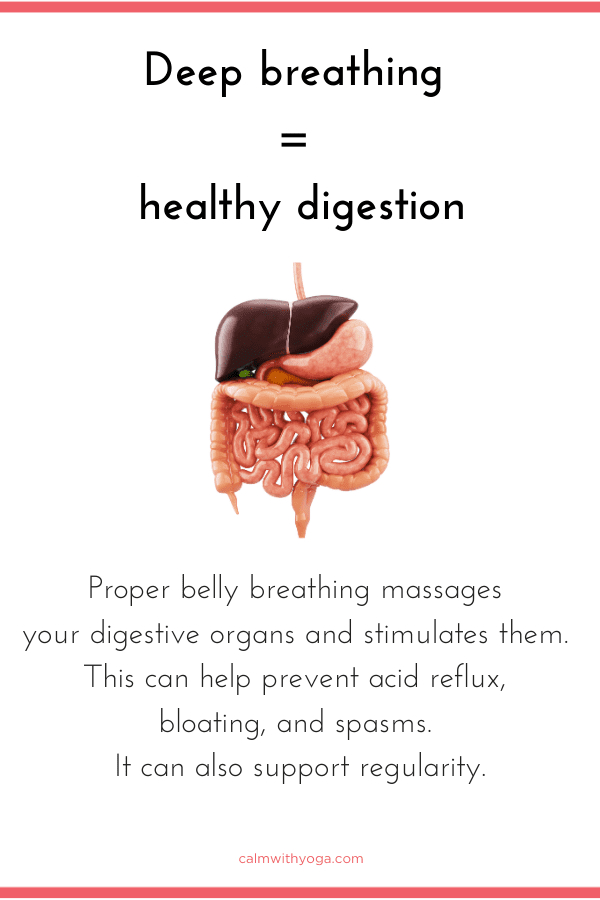
It’s been proven that deep breathing helps quell the stress response, which we’ve seen compromises digestion.
Deep breathing helps maintain healthy digestive function and help ease upset tummies.
When we breathe deeply we activate our diaphragm, the muscle above our digestive organs.
This creates a massaging motion that helps stimulate the blood flow of your intestinal tract, ensuring your gut muscles keep on moving as they’re intended to. Breathing deeply can help prevent acid reflux, bloating, hiatal hernia, and intestinal spasms. (29)
For Your Mind:
Your anxiety might be making your gut issues worse.
Here are 3 powerful choices you can make immediately that will help your mind work alongside your gut:
1. Breathe deeply and intentionally.
By changing patterns of breathing, we can change our emotional states and how we think and how we interact with the world.
– Patricia L. Gerbarg, MD, Harvard-trained psychiatrist and clinician-researcher
For the full low-down on how deep belly breathing can reduce stress and anxiety go here.
Your breath acts as a switching station for your nervous system, specifically between the part of your nervous system responsible for the stress response, and the part responsible for the relaxation/rest/digest response.
Deep breathing helps to send your body signals of safety so that you can enter into a higher state of functioning – one that is healing, regenerating, and conducive to sustained fulfillment and thriving. (30)
Deep breathing has also shown to be an effective option for treating emotional and mental health conditions such as stress, anxiety, and depression. (31)
2. Move your body mindfully and regularly.
We know that the old divisions of body and mind are false.
The body is the mind and the mind is the body.
When you take care of yourself, you are helping the whole system.
– Ben Michaelis, PhD, evolutionary clinical psychologist and author
We’ve all been told that moving our bodies is good for physical health.
Some evidence supports that 2–2.5 hours of moderate to high-intensity exercise per week is enough to lower your risk of chronic illness and mortality. (32)
And regular mindful movement also appears to be good for our mental health.
One reason is that when we’re moving the body releases feel-good chemicals like endorphins (ie: runner’s high or yoga high).
A Penn State University study found that people who move their bodies feel more uplifting emotions like excitement and enthusiasm. (33)
A Princeton University study on mice found that physical exercise prevents stress-induced activation in certain regions of the brain, thus improving anxiety regulation. (34)
By moving our bodies mindfully and regularly, we mitigate the effects of the stress response, which will improve digestion in turn.
3. Adopt a regular chanting practice.
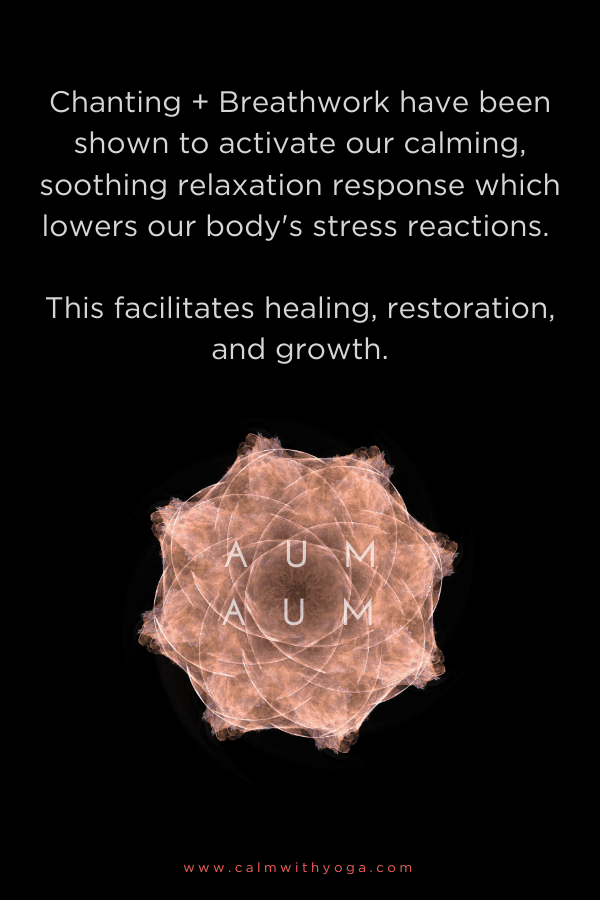
It turns out our voice and breath are all we really need to help ourselves find a calmer, safer center within.
Chanting and deep breathing stimulates the vagus nerve, a very key nerve linked to the body’s parasympathetic nervous system – the branch of your nervous system responsible for the relaxation/rest/digest response.
Dr. Stephen Porges studies how stimulating the vagus nerve helps us feel safe and therefore facilitates the ability to connect to one’s self and to others.
According to Dr. Porges stimulating this nerve leads to a lowering of our defenses, which in turn helps us become more calm, present, and mindful. (35)
By activating the relaxation/rest/digest response we support our gut in achieving optimal digestive health.
Chanting has also been found to significantly deactivate the amygdala, the brain’s emotional center that acts like an alarm system for potential threats. (36)
If you haven’t experienced a chanting practice before, it can seem awkward and maybe even daunting.
I suggest starting out small and in private to ease into it.
Sit comfortably, with the back upright.
Close your eyes.
Take a few deep breaths.
And allow the vocalization of the chant resonate within your whole body.
You can choose to start with aum (om) or simply just hum with your mouth closed.
REFERENCES
:
(1) https://www.ncbi.nlm.nih.gov/pubmed/19552631
(2) http://www.jpp.krakow.pl/journal/archive/12_11/pdf/591_12_11_article.pdf
(3) https://www.nimh.nih.gov/health/statistics/prevalence/any-anxiety-disorder-among-adults.shtml
(4) https://www.adaa.org/about-adaa/press-room/facts-statistics
(5) Australian Bureau of Statistics. (2008). National Survey of Mental Health and Wellbeing: Summary of Results, 2007. Cat. no. (4326.0). Canberra: ABS.
(6) Fineberg, N., Haddad, P., Carpenter, L., Gannon, B., Sharpe, R., Young, A., Joyce, E., Rowe, J., Wellsted, D., Nutt, D. and Sahakian, B. (2013). The size, burden and cost of disorders of the brain in the UK. Journal of Psychopharmacology, 27(9), pp.761-770.
(7) Martin-Merino, E., Ruigomez, A., Wallander, M., Johansson, S. and Garcia Rodriguez, L. (2009). Prevalence, incidence, morbidity and treatment patterns in a cohort of patients diagnosed with anxiety in UK primary care. Family Practice, 27(1), pp.9-16.
(8) http://bjp.rcpsych.org/content/190/6/521
(9) https://www.ncbi.nlm.nih.gov/pmc/articles/PMC3921083/
(10) https://amino.com/blog/chronic-gut-stomach-conditions-trends/
(11) http://www.prnewswire.com/news-releases/new-survey-reveals-more-than-half-of-americans-are-living-with-gastrointestinal-symptoms-and-not-seeking-care-from-a-doctor-230804341.html
(12) http://www.aihw.gov.au/WorkArea/DownloadAsset.aspx?id=10737422169
(13) http://patient.info/doctor/irritable-bowel-syndrome-pro
(14) https://www.hindawi.com/journals/grp/2012/606174/tab2/
(15) https://www.nih.gov/news-events/news-releases/nih-human-microbiome-project-defines-normal-bacterial-makeup-body
(16) Emeran Mayer, MD, The Mind-Gut Connection, 2016
(17) http://neuroscienceresearch.wustl.edu/userfiles/file/Gut_brain%20axis%20How%20the%20microbiome%20influences%20anxiety%20and%20depression_Tran%20%20%20.pdf
(18) https://www.nih.gov/news-events/news-releases/nih-human-microbiome-project-defines-normal-bacterial-makeup-body
(19) https://www.gastrojournal.org/article/S0016-5085(10)01006-1/fulltext
(20) https://www.sciencedirect.com/science/article/pii/S0166432814004768
(21) https://www.ncbi.nlm.nih.gov/pmc/articles/PMC1379072/
(22) http://www.altmedrev.com/archive/publications/9/2/180.pdf
(23) https://www.ncbi.nlm.nih.gov/pubmed/18461293
(24) https://www.ncbi.nlm.nih.gov/pmc/articles/PMC4566439/
(25) https://draxe.com/probiotics-benefits-foods-supplements/
(26) https://wholefoodsmagazine.com/supplements/features-supplements/pre-probiotics-thinking-outside-gut/
(27) https://www.ncbi.nlm.nih.gov/pmc/articles/PMC4410136/
(28) https://draxe.com/prebiotics/
(29) Matveikova, Irina (2014-06-16). Digestive Intelligence: A Holistic View of Your Second Brain (p. 159). Findhorn Press.
(30) https://www.youtube.com/watch?v=VAL-MMYptQc
(31) https://link.springer.com/article/10.1007/s10484-015-9279-8
(32) https://www.ncbi.nlm.nih.gov/pmc/articles/PMC3632802/
(33) https://www.eurekalert.org/pub_releases/2012-02/ps-pay020812.php
(34) https://www.ncbi.nlm.nih.gov/pubmed/23637169
(35) https://www.youtube.com/watch?v=VAL-MMYptQc
(36) https://www.ncbi.nlm.nih.gov/pmc/articles/PMC3099099/


